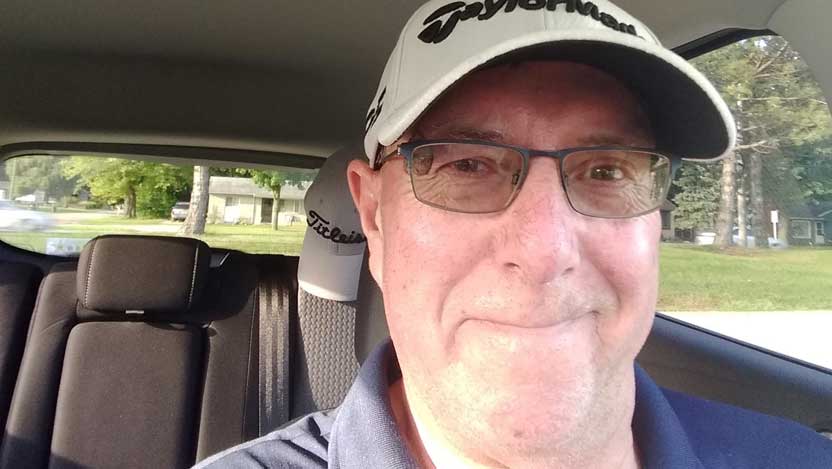CAR T-cell therapy recipient surpasses 5-year cancer-free mark

More than five years after the fact, Andrew Parker and his University of Chicago Medicine oncologist, Michael Bishop, MD, remain awed by the remarkable turnaround they witnessed thanks to CAR T-cell therapy.
In 2016, Parker, then 59, went to his primary care physician about a swollen leg and was stunned to learn he had aggressive acute lymphoblastic leukemia (ALL). The Michigan resident started an array of chemotherapy treatments, but none worked.
His health was quickly deteriorating.
His medical team suggested he contact Bishop, who was leading a clinical trial on an emerging cancer immunotherapy treatment called CAR T-cell therapy.
“They told me Dr. Bishop had something new,” Parker said. “I decided to do it. I had no choice.”
CAR T-cell therapy uses re-engineered versions of a patient’s own T-cells to find tumor cells and destroy them with minimal damage to healthy cells.
Parker qualified for the trial, but days before the process was scheduled to start, Bishop gave Parker some disappointing news.
“We can’t do it,” Bishop told him. The Food and Drug Administration (FDA) had put CAR-T treatments on hold.
Devastated, Parker returned home to Michigan believing he didn’t have much longer to live.
Bishop, meanwhile, appealed to the FDA, asking the agency to consider Parker for CAR T-cell therapy as a “compassionate use” because of the seriousness of his condition. The FDA gave Bishop the green light.
“A week later, Dr. Bishop called and said, ‘Come back! We can start!” Parker said.
Parker completed the CAR T-cell therapy treatment. As expected, he was sick for a few days and needed to be monitored in the intensive care unit. But by the third day, he felt fine.
A few weeks later, a bone marrow biopsy showed no cancer cells. Parker’s own T-cells had killed the cancer.
Since the 2016 treatment, the FDA has approved CAR T-cell therapy for use with certain types of leukemia and lymphoma. UChicago Medicine currently has 13 clinical trials for CAR T-cell therapy for different cancers, including multiple myeloma.
Within three months, Parker was healthy enough to return to his job as corporate manager of a tool and die shop. Today, the 63-year-old is back to his normal life — working, traveling, and enjoying life with his fiancé, Mary, who he calls his pillar of support during his cancer battle.
“It’s like a miracle,” Parker said.
Today, Parker gets regular infusions of immunoglobulin to protect him from infections and illness. A weakened immune system is a side effect of CAR T-cell therapy.
Every six months, he makes the seven-hour round-trip drive for a 15-minute appointment with Dr. Bishop, part of his clinical trial commitment.
“I see Dr. Bishop, give some blood, and then go home,” he said. “It’s worth every mile.”

CAR T-Cell Therapy
CAR T-cell therapy supercharges a patient's white blood cells to find and destroy cancer cells. UChicago Medicine research played a key role in the development of this exciting new immunotherapy.
View videos and learn more